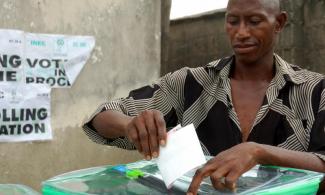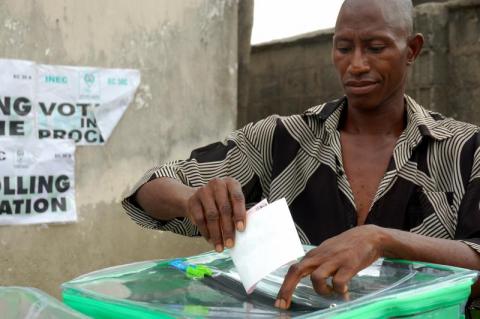
If the past is the teacher of the future, what INEC has done to ensure some electorates would not be told that their PVCs are faked; or that “the system” could not read or identify their PVCs? Have there been test-runs to demonstrate the operations of “the system” for the 2015 general elections? Did INEC solicit feedback from stakeholders from such trials? What about the refrain of electoral officials and materials not arriving on time? Are we likely to be saddled with such frustrations again? Ours is one of the few places in the world where everything stands still, including freedom of movement, on the day of election, yet every election is an exercise in the making of logistics nightmare.
As was the case in 1993, “Nigeria is on the match again” for a-make-or-mar general elections. And the Independent National Electoral Commission (INEC), the institution constitutionally saddled with conducting Nigeria’s federal elections is at the centre of that march. Would the elections be another charade or would this time be different? Would there be stalemated or conclusive, fair and free elections? Would actual winners be the official winners? The answer is blowing in the wind, and it would soon birth on the ground of reality; very soon that is.

This time around, as in the fairly recent past, funding has not been a problem with INEC. As far as I know, INEC has not complained of funding. Virtually everything it required has been accommodated under budgetary allocations. INEC has been set up in a manner that would allow for little excuse for failure. But I also know that it does not have monopoly of control over all that are essential for it to succeed in its constitutional assignment. After all, INEC does not have control over the behaviours of the political class, the electorate and the armed forces, especially the military and the police, the judiciary and other stakeholders complicit in our dismal electoral process. Neither does it have control over the country’s festering insecurity crisis that is clearly an existential danger to the forthcoming elections and to Nigeria’s corporate being. Therefore, I am self-advised in regard to the issues beyond INEC’s control.
But I must add that as an institution, INEC’s judgment and pragmatism would be tasked in all those matters whereof any of the cited stakeholders attempt to derail INEC’s discharge of its constitutional mandate. INEC needs a rapid response strategy, a highly-lawyered crisis management, observation and emergency centre as it goes through the general elections in a month’s time. But is INEC ready? How prepared for the challenges is INEC, and what are the evidence on ground? I am afraid and skeptical given that INEC has been hardly proactive or pre-emptive. It has already lost the chance to lobby the National Assembly for some contingency laws on the peculiar and potential realities of the 2015 elections, especially from security perspectives. It could be argued that any such move would be politicised and delicate, for no less a reason than its constitutional ramifications. And so what; after all, politicians constitute the National Assembly and their decisions are inherently political. Now, INEC has the misfortune of not trying and it is left to manage the consequences of its lack of foresight.
But on matters familiar, has INEC acquitted itself? The process of production and distribution of the so-called permanent voter’s card (PVC) has left much to be desired. Apart from the high percentage of those who have yet to get their cards –which is a sad commentary on voter education and mobilization – reports indicate that there are now “temporal permanent” voter’s cards. Hmmm. Elsewhere, people are advised that “the Youth Corp member” who registered them is no longer available and, as such, the affected electorates are not able to collect their PVCs. Some have been told that they needed to “buy fuel” for the generator required “to power the system” in order to get their PVCs. Others have been advised to bring their laptops as part of the process. A prominent political party has been cited with complicity related to the cloning of the so-called PVCs. Hoodlums – those mutating and familiar creatures ever present in Nigeria’s electoral lexicon – are reported to have snatched PVCs in some parts of the country. By February 14, would INEC be able to assure Nigerians that all willing and eligible electorates would have secured their authentic PVCs and are guaranteed to put the cards to legitimate use?
Or, would it be the recurring of all-too-familiar frustrations for the electorate. If the past is the teacher of the future, what INEC has done to ensure some electorates would not be told that their PVCs are faked; or that “the system” could not read or identify their PVCs? Have there been test-runs to demonstrate the operations of “the system” for the 2015 general elections? Did INEC solicit feedback from stakeholders from such trials? What about the refrain of electoral officials and materials not arriving on time? Are we likely to be saddled with such frustrations again? Ours is one of the few places in the world where everything stands still, including freedom of movement, on the day of election, yet every election is an exercise in the making of logistics nightmare. How about “snatching of electoral materials by hoodlums”? This time around, such materials include computers, electrical charging complements and other ballot paraphernalia. Does INEC have the right tech support for tracing such equipment or sabotaging their use? Is INEC ready for hackers who could potentially try to sabotage the elections?
Is INEC able to support citizen vigilantism through citizen deployment of information technology, especially smart phones, iPads, cameras and other devices to capture criminal behaviours or would INEC align with the police, politicians and hoodlums to assault or even torture potential partners in credible elections? What plan does INEC have for those untouchable politicians who will certainly exercise lien over multiple PVCs demanding to dictate how their hungry “owners” would vote?
What has INEC done for the 2015 election that it did not do in the past to address these recurring crises? How tech-savvy are INEC officials and foot soldiers, what quality of training have they received? Are Nigerians to be held up at voting centres by those who punch one key per minute on the board? That is even when the county has a teaming technologically competent youth population that could be used to showcase efficient and effective electoral services delivery on the day of the election as well as for sustainable electoral institutional capacity building. Would INEC be willing to encourage citizen partnership in accountability and defence of their votes during the postelection collations of votes or would such citizens be whisked away by overzealous rented security agents doing the bidding of politicians?
In between elections, INEC has the opportunity for institutional development and capacity building. Election days present direct test of how best INEC has evolved, and how efficiently it has been able to channel its resources. For the 2015 elections, the challenges are multi-faceted. Many of the challenges are outside the legitimate domain of INEC. Yet INEC would certainly be faced with unprecedented contexts for pragmatic interventions and contingent decision-making. Those may perhaps be the hardest part. But no less important, is INEC’s ability to avoid the familiar trajectories of Nigeria’s shameful electoral experience. Signals so far show INEC walking a faint borderline of failure foretold and success unforeseen. Good luck Nigeria! No pun intended.
Chidi Oguamanam Professor of Law, University of Ottawa. Follow him on Twitter: @chidi_oguamanam.